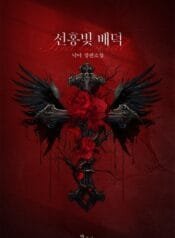Chapter 14
In the dim room, Zechart’s steps, which at first seemed headed toward the bed, soon changed course toward the bookshelf. He’d almost forgotten for a moment, but after all, his goal was the codebook with the Enigma settings. His hands quickly scanned the row of philosophy and literature—useless books—before landing on an old set of drawers at the bottom.
The first and second drawers opened easily, but the last was another matter. Clack—the drawer rattled against its lock with a plaintive sound.
With a flick of annoyance, Zechart pulled a thin piece of metal from his pocket. It wasn’t even a sophisticated lock, just a cheap hardware store latch—child’s play for someone like him.
Sure enough, he slid the metal into the keyhole and jiggled it a few times; the lock yielded as if it had never been closed at all.
A faint laugh escaped his lips. The window, the drawer—he couldn’t help but find it a little endearing, or perhaps pathetic, that the woman would feel safe with just these. He’d felt something similar when he discovered her picky eating, so carefully concealed behind a composed facade.
Slide. At last, the final drawer opened. Since it was the only one with a lock, what lay inside was extremely personal: a bit of jewelry that might have some value, a photograph of a child from a few years ago—likely younger than his memories—and, most of all, what looked like an old diary.
He took out the diary, which looked thoroughly ordinary apart from its dog-eared, double-folded pages.
Maybe, just maybe, this was what he was looking for. With a small hope, Zechart opened it and unfolded the first doubled page. The woman’s neat handwriting filled the space. If it wasn’t a codebook, it was probably a diary—he’d expected as much. But to his surprise, the contents were a letter.
A foolish letter, written for someone who would never receive it.
[To Maximilian.
Today, Leon was terribly sick. Even the fever medicine didn’t work, so I was up all night.
I can’t help but think maybe he takes after you, what with all these childhood illnesses. I’ve never actually heard what you were like as a child, but apparently, I was a very healthy one.
Honestly, on days like this, I kind of resent you.
No, if I’m being honest, there were a lot of days I resented you.
(skip)]
[When I was pregnant with Leon, my morning sickness was so bad that there were nights when I couldn’t eat a single thing. Then one night, just before dawn, I suddenly craved fruit so badly. Anything sour would have done, but in the end, I couldn’t have any. The next day, I bought some kiwis myself, and you have no idea how upset I was, or how much I resented you… You’ll never know.]
Zechart suddenly pressed his hand to his chest. The more he read her letter, the more a sharp pain shot through a heart that had always been hardened and numb to everything. When her circumstances overlapped with the recent conversation between the homeowners, the pain only intensified.
So this was sympathy, after all. Clenching his jaw, Zechart decided that must be the feeling he had for her.
[Even right after I gave birth to Leon, and whenever he did something sweet as he grew, I felt the same way. Don’t think I’m being unfair. You have no right to complain about these little resentments.]
At this point, she must have been crying. The traces of her trembling hand were clear in the writing.
How foolish.
Closing the diary, Zechart stood up. He decided to leave the house for now. Since the owners had returned, it was impossible to continue searching. It was a shame he hadn’t found the codebook, but he hadn’t come away completely empty-handed. The letter, after all, read almost like a diary. If he was lucky, their plans might be written in it as well.
The problem was, if he took it with him, it would be noticed right away…
With the diary tucked into his coat, Zechart narrowed his eyes, searching for a solution. That was when he spotted the oil lamp on the desk.
A small, crooked smile appeared at the corner of his lips.
***
“So what you’re trying to do right now is…”
Edith couldn’t hide her disbelief. It was because of what Gisela had finally revealed. As if expecting this kind of reaction, the freckles scattered across Gisela’s cheeks turned even redder.
“It’s just that… you’re the only married woman around me. And since you got married so young, I figured you might know more… and, well… I don’t know, I just felt like you’d be good at giving this sort of advice…”
Gisela kept rambling excuses, and Edith finally let out a sigh that was almost a laugh. There was a bit of relief mixed in, too. Gisela had hesitated so much that Edith was worried it might be something truly serious that she wouldn’t be able to help with. But to think it was this sort of concern. In the end, Gisela’s reason was none other than wanting relationship advice.
Well, in some ways, that could be pretty serious too. Chuckling, Edith asked,
“How long have you two been seeing each other?”
“It’s been… a year. But he never brings up marriage. There’s been no progress, so I haven’t even told my family about him. Do you think I’m not marriage material?”
Gisela answered with a rather serious look on her face. She’d blurted it out without much thought, but it wasn’t a lie; it was something she’d really been worrying about lately. In that sense, suddenly asking for relationship advice was a pretty good choice. As a fellow woman, there was nothing more interesting to talk about.
Before she knew it, Edith found herself smiling as she asked,
“Do you want to marry him, Gisela?”
“Yes. I haven’t dated a lot, but… you know that feeling? Like if it’s this man, I could be happy, even married…”
“Didn’t you feel that way, Liche?”
Gisela’s question brought a wistful smile to Edith’s lips. It was because she immediately thought of Maximilian.
“I did. Me too.”
Maybe back then, she really was a hopeless romantic. After all, she believed in fate just because she’d seen the Kaprang sea with him that one time—even though it wasn’t even a date. She was so sure he felt the same way, too.
‘I’ll write you,’ she’d said, boldly, as they parted ways.
She hadn’t even considered that he might refuse.
But—
‘I won’t be able to reply.’
His answer had come after a brief pause, and it was just as blunt and unyielding as ever.
“So, how did you send him letters?”
Edith’s expression turned a little sulky, as if she was remembering that time. Now that she knew his true position wasn’t just an army officer, but the commander of a covert operations unit, she could understand his reaction—but back then, she’d honestly felt a little hurt.
“I told him it didn’t matter.”
“What?”
“I just felt like… I couldn’t let things end like that. And honestly, it didn’t matter if he ever replied or not.” Even Edith herself hadn’t expected it, but when love had come for her so suddenly, she’d been surprisingly bold. She’d managed to wrangle his address from him, even when he’d been so reluctant.
Right after she returned to Berg, she started writing to him incessantly. The contents weren’t particularly important—sometimes just stories about the weather in Berg, what she’d had for lunch, little pieces of daily life. She wrote about the Kaprang seaside they’d visited together, and about places in Hasmal she wanted to see one day but hadn’t had the chance to.
Just as he’d said, not a single reply ever came.
“Your husband must’ve been really handsome.”
“What makes you think that?”
“Well, for you to fall for him at first sight and keep writing to him, even without getting a single letter back…”
“Well, you’re not wrong.”
Beneath his cold exterior, when he smiled, the way his eyes crinkled, the elegant line of his nose, the red lips, the strong jaw—
Even setting infatuation aside, Maximilian’s looks really were the sort you could fall for at first sight. But that wasn’t why Edith kept sending letters with no response…
“He never wrote back, but sometimes, he’d just show up.”
“He came in person?”
Gisela’s eyes went wide with surprise. A faint dimple appeared on Edith’s now slightly flushed cheek.
“Yes.”
Of course, it wasn’t often. Just once every few months. And never a word beforehand—he’d simply show up.
Whenever he came out of the blue like that, he’d tell her things in person that he couldn’t write in a letter. Stories about the weather in Hasmal, which was so different from Berg, about a delicious tomato stew he’d eaten lately, or secret tourist spots in Hasmal that only locals knew about.
It was around then that Edith—who had no particular talent for cooking and didn’t even like tomato stew—started practicing over and over to get it right.
“And after failing countless times, when I finally managed to make a decent tomato stew, that’s when I proposed to him.”
“You proposed?”
Gisela’s brown eyes grew even wider, and her astonished face was reflected in Edith’s softly smiling one.
“Yes.”
If she had to choose the most nerve-wracking moment of her life, Edith wouldn’t hesitate to say it was that—when she proposed to Maximilian.






